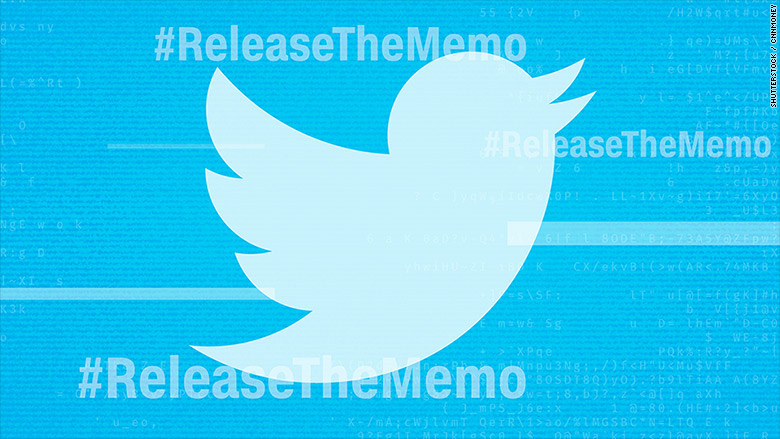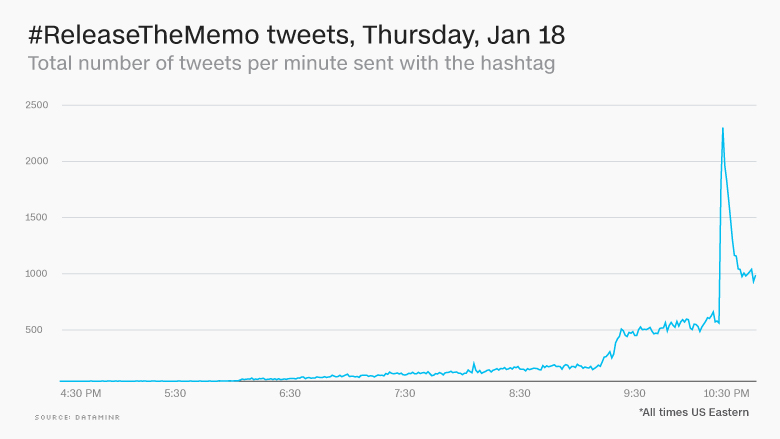
The viral hashtag campaign #ReleaseTheMemo appears to have been driven at least in part by a swarm of Twitter accounts set up in the past week, a CNN analysis has found.
More than 1,000 accounts that were set up between Thursday -- when the hashtag first appeared -- and Sunday night have tweeted the hashtag. 460 of those were what are known as "egg accounts," accounts that don't even have a profile picture. About 200 of the accounts had sent only four or fewer tweets by Sunday night, with at least one of those featuring the #ReleaseTheMemo hashtag.
The memo in question is a document spearheaded by Republican Rep. Devin Nunes, the chairman of the House Intelligence Committee. It details what it alleges are FBI surveillance abuses during the 2016 election. While some Republicans and Trump supporters in the House and outside of it want the memo to be made public, Democrats say it's misleading, and an effort to torpedo special counsel Robert Mueller's investigation into the Trump campaign.
Related: Senate Intelligence Committee not given access to Nunes FISA memo
Software developed by the German Marshall Fund's Alliance for Securing Democracy showed that #ReleaseTheMemo was one of the talking points being pushed most frequently on Thursday and throughout the weekend by a group of Twitter accounts it believes to be part of "Russian-linked influence networks" on the platform.
The group does not disclose which accounts it tracks and CNN has not independently verified its findings.
On Tuesday, two top congressional Democrats, Sen. Dianne Feinstein and Rep. Adam Schiff, wrote to the CEOs of Facebook and Twitter calling on the companies to conduct an "in-depth forensic examination of this real-time activity on your platforms."
The letter was prompted by the Alliance for Securing Democracy's findings, although those findings were about Twitter, not Facebook.
Twitter told CNN on Tuesday that it was looking forward to working with Feinstein and Schiff and addressing their questions. Facebook said that it had received the letter and was reviewing it.
It's not clear that any such analysis will show that Russians had anything to do with the hashtag's popularity, or even that bots did. The Daily Beast reported Tuesday that Twitter's internal analysis has "found that authentic American accounts, and not Russian imposters or automated bots, are driving #ReleaseTheMemo." And a number of people with influence both on Twitter and in the media have promoted the campaign and the hashtag. Nor does CNN's analysis suggest that the hashtag was manufactured, even though some of the support for it appears to have been.

What the discovery of the newly created accounts does show, though, is the challenges facing Twitter and other social media companies as they try to manage the effects that their platforms and the manipulation of them can have on democracies. Many of the accounts identified do not clearly break Twitter's terms of service, but anonymous accounts tweeting the same thing en masse can help make causes appear to have more support than they do.
CNN's analysis found that between Thursday and Sunday night, newly created accounts (which are not necessarily related to Russia or to any other state actor) tweeted or retweeted the hashtag more than 5,000 times -- a tiny fraction of the total number of tweets which included the hashtag, but also only a small fraction of the anonymous and automated accounts pushing the hashtag.
In the eight hours after the first tweet using the #ReleaseTheMemo hashtag was sent, CNN's analysis found, some 130 accounts that would eventually use the hashtag were created. As of Sunday night, those accounts had together sent more than 800 tweets which included the hashtag.
CNN worked with New Knowledge, a company that tracks the spread of information online, on the analysis. New Knowledge also works with the Alliance for Securing Democracy.
Included in the tweets CNN analyzed were accounts that showed signs of bot-like, automated behavior, explained Jonathan Morgan, the founder of New Knowledge, who previously advised the White House and State Department during the Obama administration about combating terrorist propaganda online. Morgan said that this could indicate that much of the broader conversation was influenced by automated accounts.
Much of the hashtag's virality was due to legitimate, organic activity. Republican lawmakers, prominent conservative media figures and the president's son, Donald Trump Jr., all helped the hashtag trend with their own tweets. One tweet from Rep. Mark Meadows, who said he had read the memo and described it as "shocking," was retweeted almost 50,000 times. Media coverage also likely played a role as well.
But any influence from a large number of newly created accounts, or larger bot campaigns, can be cause for concern given the experience of the 2016 election.
"Accounts that coordinate their activity to amplify content greatly increase the number of people that see that content by keeping it visible for longer. If topics are like beach balls, rising and falling, bots bat the ball back into the air repeatedly, keeping it afloat higher and for longer. The longer the time period the hashtag is out in Twitter users' feeds, the greater the chance users will see it and retweet it to their followers," Becky Ruppel, a data scientist at New Knowledge, told CNN.
On its website, Twitter says that the number of tweets is only one of the factors considered in determining the ranking of trending topics on its platform.
Twitter told CNN on Monday that the company takes steps to limit the impact of "lower-quality content, like duplicate Tweets or content that appears to be automated" on its "Trending Topics" section.
When CNN asked Twitter about the hundreds of new accounts pushing #ReleaseTheMemo, Twitter said it was aware of the issue and would take action against any accounts that violate their terms of service.
Many of the accounts CNN found, even those seemingly created solely to promote the hashtag, do not appear to be in breach of Twitter's terms of service, though Twitter would likely consider them "lower-quality content" and discount them to some extent in determining "Trending Topics."


